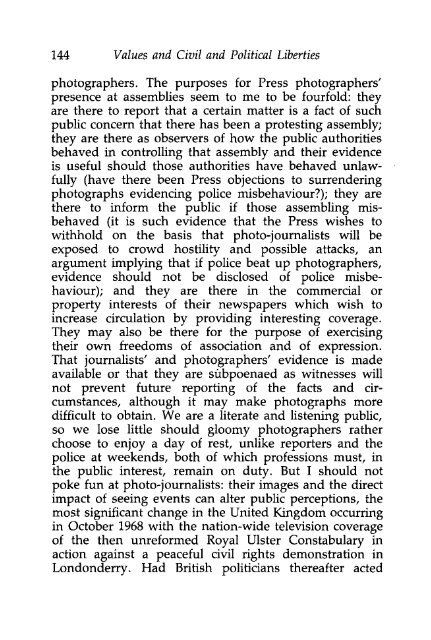The United Kingdom and Human Rights - College of Social ...
The United Kingdom and Human Rights - College of Social ...
The United Kingdom and Human Rights - College of Social ...
Create successful ePaper yourself
Turn your PDF publications into a flip-book with our unique Google optimized e-Paper software.
144 Values <strong>and</strong> Civil <strong>and</strong> Political Liberties<br />
photographers. <strong>The</strong> purposes for Press photographers'<br />
presence at assemblies seem to me to be fourfold: they<br />
are there to report that a certain matter is a fact <strong>of</strong> such<br />
public concern that there has been a protesting assembly;<br />
they are there as observers <strong>of</strong> how the public authorities<br />
behaved in controlling that assembly <strong>and</strong> their evidence<br />
is useful should those authorities have behaved unlawfully<br />
(have there been Press objections to surrendering<br />
photographs evidencing police misbehaviour?); they are<br />
there to inform the public if those assembling misbehaved<br />
(it is such evidence that the Press wishes to<br />
withhold on the basis that photo-journalists will be<br />
exposed to crowd hostility <strong>and</strong> possible attacks, an<br />
argument implying that if police beat up photographers,<br />
evidence should not be disclosed <strong>of</strong> police misbehaviour);<br />
<strong>and</strong> they are there in the commercial or<br />
property interests <strong>of</strong> their newspapers which wish to<br />
increase circulation by providing interesting coverage.<br />
<strong>The</strong>y may also be there for the purpose <strong>of</strong> exercising<br />
their own freedoms <strong>of</strong> association <strong>and</strong> <strong>of</strong> expression.<br />
That journalists' <strong>and</strong> photographers' evidence is made<br />
available or that they are subpoenaed as witnesses will<br />
not prevent future reporting <strong>of</strong> the facts <strong>and</strong> circumstances,<br />
although it may make photographs more<br />
difficult to obtain. We are a literate <strong>and</strong> listening public,<br />
so we lose little should gloomy photographers rather<br />
choose to enjoy a day <strong>of</strong> rest, unlike reporters <strong>and</strong> the<br />
police at weekends, both <strong>of</strong> which pr<strong>of</strong>essions must, in<br />
the public interest, remain on duty. But I should not<br />
poke fun at photo-journalists: their images <strong>and</strong> the direct<br />
impact <strong>of</strong> seeing events can alter public perceptions, the<br />
most significant change in the <strong>United</strong> <strong>Kingdom</strong> occurring<br />
in October 1968 with the nation-wide television coverage<br />
<strong>of</strong> the then unreformed Royal Ulster Constabulary in<br />
action against a peaceful civil rights demonstration in<br />
Londonderry. Had British politicians thereafter acted

















